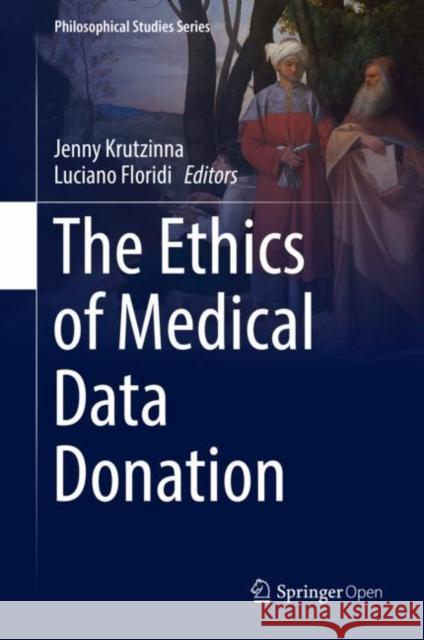The Ethics of Medical Data Donation » książka



The Ethics of Medical Data Donation
ISBN-13: 9783030043629 / Angielski / Twarda / 2019 / 198 str.
The Ethics of Medical Data Donation
ISBN-13: 9783030043629 / Angielski / Twarda / 2019 / 198 str.
(netto: 191,66 VAT: 5%)
Najniższa cena z 30 dni: 192,74
ok. 16-18 dni roboczych.
Darmowa dostawa!
This open access book presents an ethical approach to utilizing personal medical data.
"This book will be appreciated by interdisciplinary scholars and graduate students actively working to concretize the future of policy and ethics regarding data sharing in a globalized, information-based age. ... readers of various backgrounds will find this book to be a rich and useful exploration ... . The book is an accessible, useful, and engaging first step in one of the frontiers of interdisciplinary research." (Alec Arnold, Doody's Book Reviews, December 7, 2019)
Chapter 1. Introduction (Jenny Krutzinna and Luciano Floridi).- Part I: Conceptualising the Ethics of Medical Data Donation.- Chapter 2. Data Donation: How to Resist the iLeviathan (Barbara Prainsack).- Chapter 3. Data Donations as Exercises of Sovereignty (Patrik Hummel, Matthias Braun and Peter Dabrock).- Chapter 4. The Ethics of Uncertainty for Data Subjects (Philip J. Nickel).- Chapter 5. Incongruities and Dilemmas in Data Donation: Juggling our 1s and 0s (Kerina H. Jones).- Part II: Governance and Regulation of Medical Data Donation.- Chapter 6. Posthumous Medical Data Donation: The Case for a Regulatory Framework (Edina Harbinja).- Chapter 7. Medical Data Donation, Consent and the Public Interest after Death: A Gateway to Posthumous Data Use (Annie Sorbie).- Part III: Implementing Ethical Medical Data Donation.- Chapter 8. The Personal Data is Political (Bastian Greshake Tzovaras and Athina Tzovara).- Chapter 9. Personal Data Cooperatives – A New Data Governance Framework for Data Donations and Precision Health (Ernst Hafen).- Chapter 10. Defining Data Donation After Death: Metadata, Families, Directives, Guardians and the Road to Big Consent (David M. Shaw).- Part IV: An Ethical Code for Posthumous Medical Data Donation.- Chapter 11. Enabling Posthumous Medical Data Donation: A Plea for the Ethical Utilisation of Personal Health Data (Jenny Krutzinna, Mariarosaria Taddeo and Luciano Floridi).- Chapter 12. An Ethical Code for Posthumous Medical Data Donation (Jenny Krutzinna, Mariarosaria Taddeo and Luciano Floridi).
Dr Jenny Krutzinna is a Postdoctoral Researcher at the Centre for Research on Discretion and Paternalism, Department of Administration and Organization Theory, University of Bergen, Norway. Previously, she was a Postdoctoral Researcher in the Ethics of Biomedical Big Data at the Digital Ethics Lab at the Oxford Internet Institute, University of Oxford, UK.
Dr Luciano Floridi is Professor of Philosophy and Ethics of Information at the University of Oxford, where he is also the Director of the Digital Ethics Lab of the Oxford Internet Institute. He is Turing Fellow and Chair of the Data Ethics Group of the Alan Turing Institute.
This open access book presents an ethical approach to utilizing personal medical data. It features essays that combine academic argument with practical application of ethical principles. The contributors are experts in ethics and law. They address the challenges in the re-use of medical data of the deceased on a voluntary basis. This pioneering study looks at the many factors involved when individuals and organizations wish to share information for research, policy-making, and humanitarian purposes.
Today, it is easy to donate blood or even organs, but it is virtually impossible to donate one’s own medical data. This is seen as ethically unacceptable. Yet, data donation can greatly benefit the welfare of our societies. This collection provides timely interdisciplinary research on biomedical big data. Topics include the ethics of data donation, the legal and regulatory challenges, and the current and future collaborations.
Readers will learn about the ethical and regulatory challenges associated with medical data donations. They will also better understand the special nature of using deceased data for research purposes with regard to ethical principles of autonomy, beneficence, and justice. In addition, the contributors identify the key governance issues of such a scheme. The essays also look at what we can learn in terms of best practice from existing medical data schemes.
1997-2026 DolnySlask.com Agencja Internetowa
KrainaKsiazek.PL - Księgarnia Internetowa









